Available Advanced Copy Combinations
Different Advanced Copy types can be combined and used together.
Restore OPC
After sending instructions to implement OPC, QuickOPC, SnapOPC, and/or SnapOPC+, data can be restored by implementing OPC from the copy destination to the copy source. Because it is OPC, logical copies are completed instantly.
For OPC/QuickOPC, a restoration from the copy destination can be completed even when a physical copy is being performed in the background.
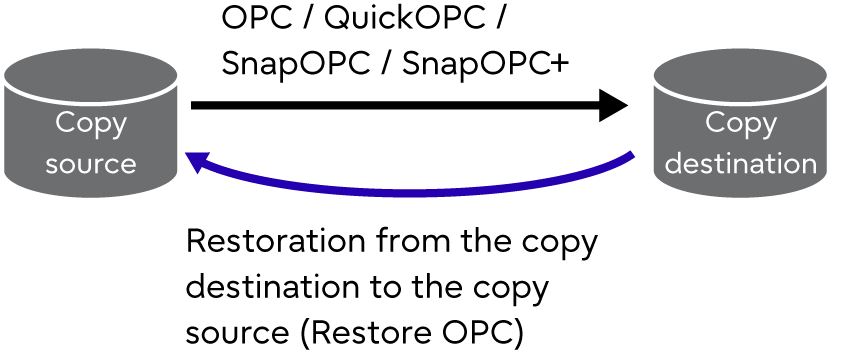
EC or REC Reverse
Restoration can be performed by reversing the copy source and destination of the EC or the REC.
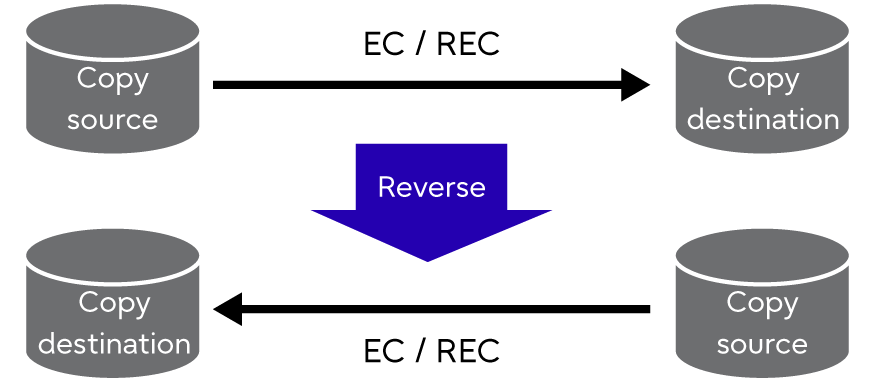
Multi-Copy
Multiple copy destinations can be set for a single copy source area to obtain multiple backups.
Even if the beginning and end of the copy source areas for the copy sessions do not match, multi-copy can be performed for the overlapping copy source area.
In the multi-copy shown in Figure: Targets for the Multi-Copy Function, the entire range that is copied for copy session 1 will be the target for the multi-copy function.
When copy sessions 1 and 2 are EC/REC, updates to area A in the copy source (update 1) are copied to both copy destination 1 and copy destination 2.
Updates to areas other than A in the copy source (update 2) are copied only to copy destination 2.

Up to eight OPC, QuickOPC, SnapOPC, EC, or REC sessions can be set for a multi-copy.
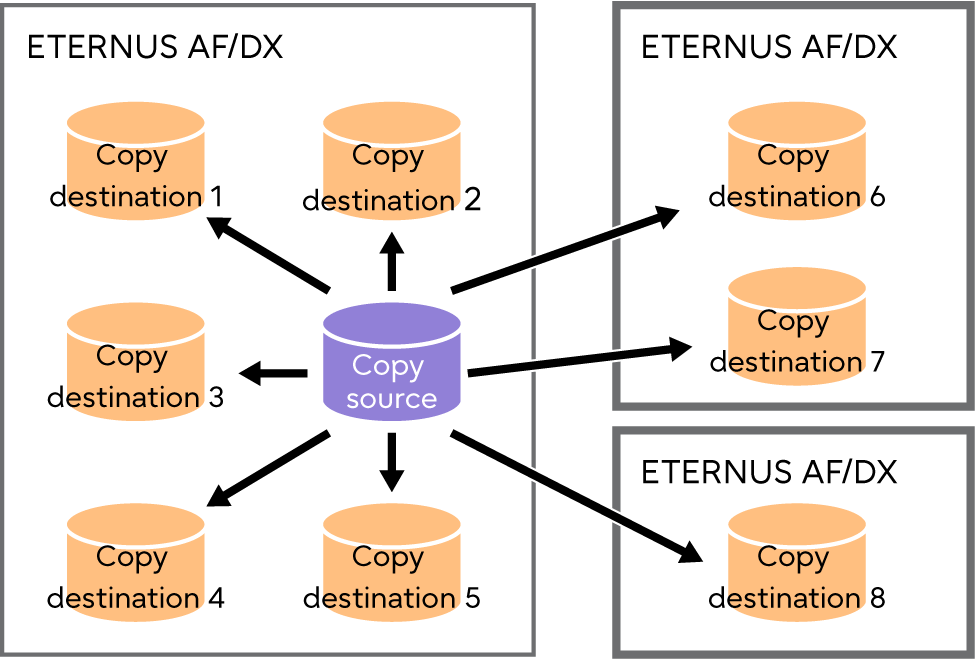
For a SnapOPC+, the maximum number of SnapOPC+ copy session generations can be set for a single copy source area when seven or less multi-copy sessions are already set.
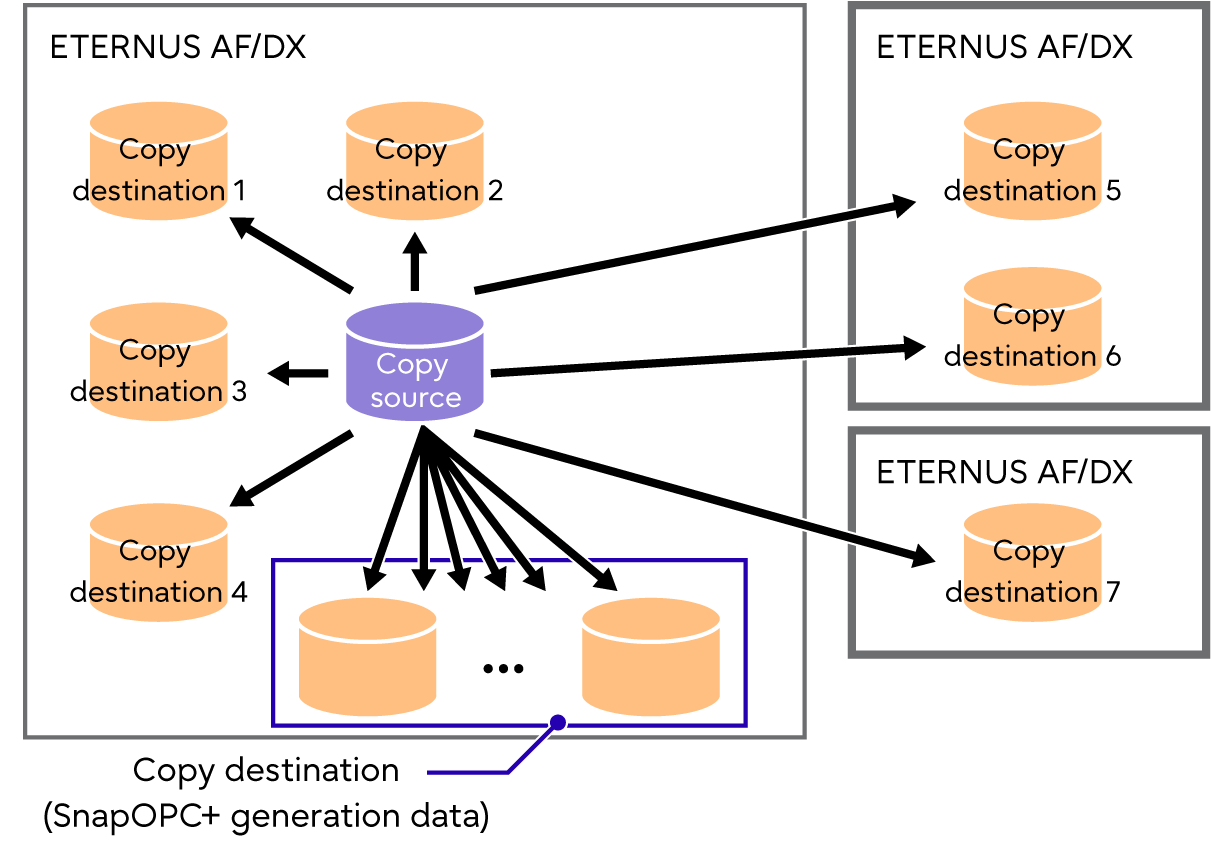
Note that when the Consistency mode is used, a multi-copy from a single copy source area to two or more copy destination areas in a single copy destination storage system cannot be specified. A multi-copy from the same copy source area to different copy destination storage systems can be specified.
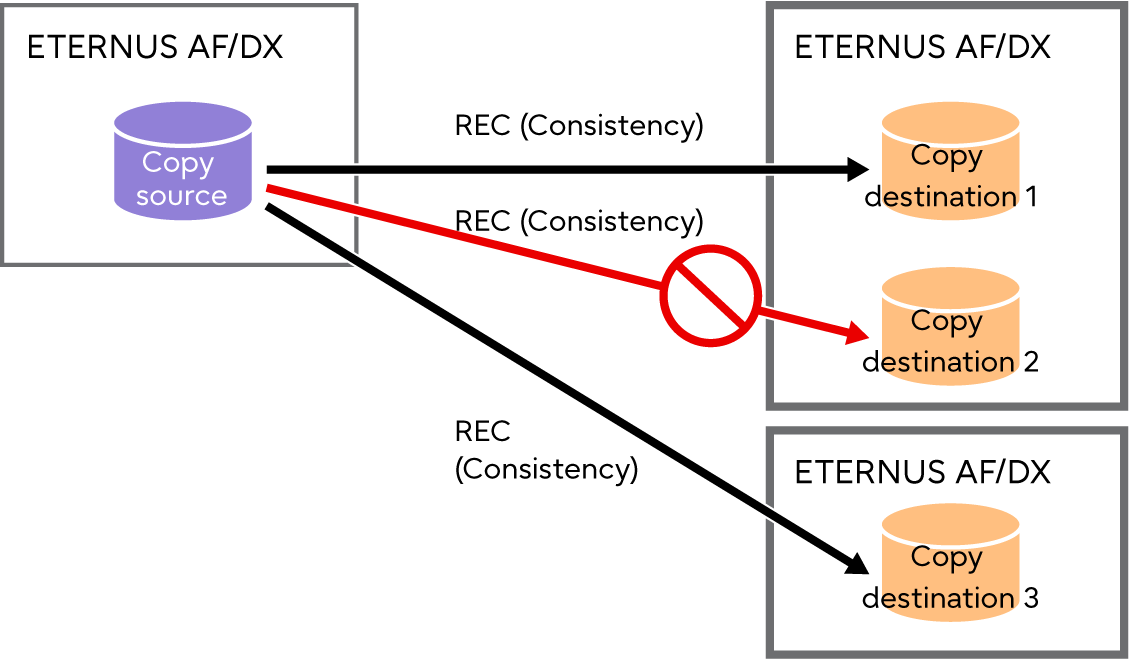
When performing a Cascade Copy for an REC session in Consistency mode, the copy source of the session must not be related to another REC session in Consistency mode with the same destination storage system.
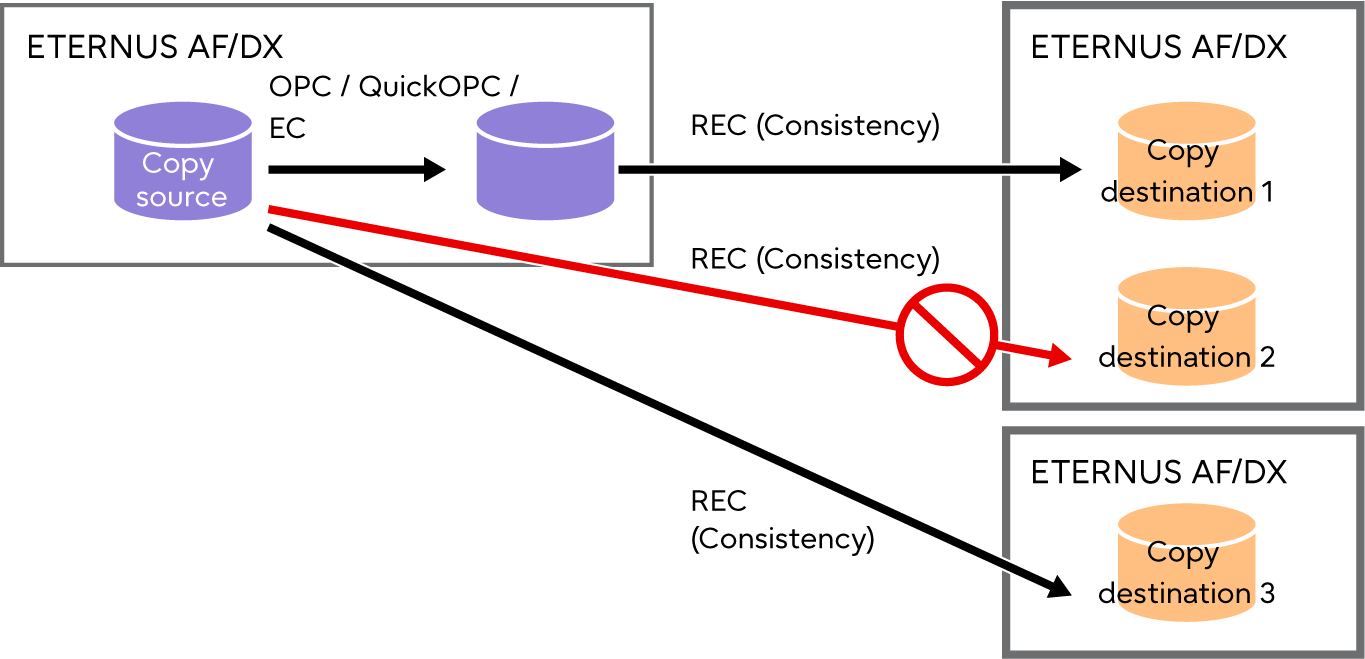
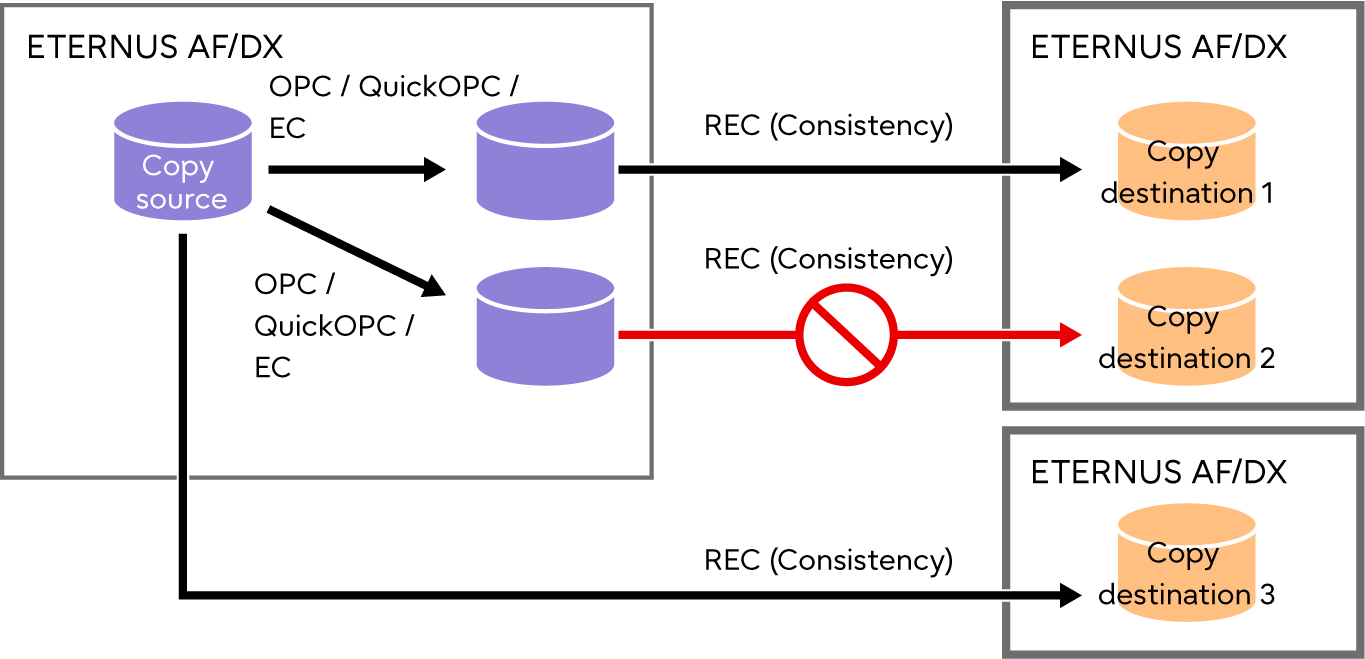
Cascade Copy
A copy destination with a copy session that is set can be used as the copy source of another copy session.
A Cascade Copy is performed by combining two copy sessions.
In Figure: Cascade Copy, "Copy session 1" refers to a copy session in which the copy destination area is also used as the copy source area of another copy session. "Copy session 2" refers to a copy session in which the copy source area is also used as the copy destination area of another copy session.
For a Cascade Copy, the copy destination area for copy session 1 and the copy source area for copy session 2 must be identical or the entire copy source area for copy session 2 must be included in the copy destination area for copy session 1.
A Cascade Copy can be performed when all of the target volumes are the same size or when the copy destination volume for copy session 2 is larger than the other volumes.

Table: Available Cascade Copy Combinations (When a Cascade Copy Performs Session 1 Followed by Session 2) shows the supported combinations when adding a copy session to a copy destination volume where a copy session has already been configured.
Copy session 2 |
Copy session 1 |
|||||||
|---|---|---|---|---|---|---|---|---|
OPC |
QuickOPC |
SnapOPC |
SnapOPC+ |
EC |
REC synchronous transmission |
REC Stack mode |
REC Consistency mode |
|
OPC |
¡ (*1) |
¡ (*1) |
¡ (*1) |
× |
¡ |
¡ |
¡ |
¡ |
QuickOPC |
¡ (*1) |
¡ (*1) (*2) |
¡ (*1) |
× |
¡ |
¡ |
¡ |
¡ |
SnapOPC |
¡ (*1) |
¡ (*1) |
× |
× |
¡ |
¡ |
¡ |
¡ |
SnapOPC+ |
¡ (*1) |
¡ (*1) |
× |
¡ |
¡ |
¡ |
¡ |
¡ |
EC (*3) |
¡ |
¡ |
¡ |
× |
¡ |
¡ |
¡ |
¡ |
REC synchronous transmission (*3) |
¡ |
¡ |
¡ |
× |
¡ |
¡ |
¡ |
¡ (*4) |
REC Stack mode (*3) |
¡ |
¡ |
¡ |
× |
¡ |
¡ |
¡ |
¡ |
REC Consistency mode (*3) |
¡ |
¡ |
× |
× |
¡ |
¡ |
¡ |
¡ (*4) |
¡: Possible, ×: Not possible
| *1 | : | If copy session 2 is an OPC, QuickOPC, SnapOPC, or SnapOPC+ session, the data in the copy destination of copy session 1 is backed up but the data in the copy source is not. |
||||||||||||||||
| *2 | : | When issuing a re-copy request for copy session 1 (a request to copy only the data that has been updated after all data is copied), the modified data size should conform to the sizes shown in Table: Modified Data Size for Each QuickOPC Resolution. For example, when a QuickOPC session is created at a resolution of 2, the modified data size should be less than 2TB. The "Resolution" for QuickOPC sessions can be checked on the [Advanced Copy (QuickOPC Sessions)] screen.
If a re-copy request is issued for a larger size, the command for the re-copy request may time out and fail. The current "Modified Data Size" for copy session 1 can be checked on the [Advanced Copy (QuickOPC Sessions)] screen. If an error occurs for copy session 1, perform one of the following operations instead.
|
||||||||||||||||
| *3 | : | To suspend a Cascade Copy where session 2 is an EC or REC session, perform the Suspend command after the physical copy for copy session 1 is complete. |
||||||||||||||||
| *4 | : | When copy session 1 uses the REC Consistency mode, the data transmission sequence of copy session 1 is guaranteed, but the data transmission sequence of copy session 2 is not guaranteed. |
Table: Available Cascade Copy Combinations (When a Cascade Copy Performs Session 2 Followed by Session 1) shows the supported combinations when adding a copy session to a copy source volume where a copy session has already been configured.
Copy session 1 |
Copy session 2 |
|||||||
|---|---|---|---|---|---|---|---|---|
OPC |
QuickOPC |
SnapOPC |
SnapOPC+ |
EC |
REC synchronous transmission |
REC Stack mode |
REC Consistency mode |
|
OPC |
¡ |
¡ |
¡ |
¡ |
¡ |
¡ |
¡ |
¡ |
QuickOPC |
¡ |
¡ (*1) |
¡ |
¡ |
¡ |
¡ |
¡ |
¡ |
SnapOPC |
× |
× |
× |
× |
× |
× |
× |
× |
SnapOPC+ |
× |
× |
× |
× |
× |
× |
× |
× |
EC |
¡ |
¡ |
¡ |
¡ |
¡ |
¡ |
¡ |
¡ |
REC synchronous transmission |
¡ |
¡ |
¡ |
¡ |
¡ |
¡ |
¡ |
¡ |
REC Stack mode |
¡ |
¡ |
¡ |
¡ |
¡ |
¡ |
¡ |
¡ |
REC Consistency mode |
¡ |
¡ |
¡ |
¡ |
¡ |
¡ (*2) |
¡ |
¡ (*2) |
¡: Possible, ×: Not possible
| *1 | : | The appropriate resolution varies depending on the modified data size that is set when a re-copy request is issued for copy session 1. For details, refer to footnote *2 of Table: Available Cascade Copy Combinations (When a Cascade Copy Performs Session 1 Followed by Session 2). |
| *2 | : | When copy session 1 uses the REC Consistency mode, the data transmission sequence of copy session 1 is guaranteed, but the data transmission sequence of copy session 2 is not guaranteed. |
A Cascade Copy can be performed when the copy type for copy session 1 is XCOPY or ODX. The copy destination area for XCOPY or ODX and the copy source area for copy session 2 do not have to be completely identical. For example, a Cascade Copy can be performed when the copy source area for copy session 2 is only part of the copy destination area for copy session 1.
XCOPY or ODX cannot be set as the copy type for copy session 2 in a Cascade Copy.
For more details on XCOPY and ODX, refer to Server Linkage Functions.
To acquire valid backup data in the copy destination for copy session 2, a physical copy must be completed or suspended in all of the copy sessions that configure the Cascade Copy. Check the copy status for copy sessions 1 and 2 when using the backup data.
However, if a Cascade Copy performs session 1 before session 2, and copy session 1 is an OPC or QuickOPC session and copy session 2 is an OPC, QuickOPC, SnapOPC, or SnapOPC+ session, the data in the copy destination for copy session 2 is available even during a physical copy.
If copy session 1 is an EC or REC session and copy session 2 is an OPC, QuickOPC, SnapOPC, or SnapOPC+ session, setting copy session 2 after setting copy session 1 to an equivalent or suspended state is recommended.
When stopping an OPC or QuickOPC session for copy session 1 during a physical copy, stop copy session 2 in advance if copy session 2 is an OPC, QuickOPC, SnapOPC, or SnapOPC+ session.
If copy session 2 is an EC or REC session, copy session 2 does not transition to an equivalent state until the physical copy for copy session 1 is complete. For an EC session, a copy session cannot be suspended until the session transitions to an equivalent state.
If a Cascade Copy performs session 1 before session 2, and copy session 1 is an OPC or QuickOPC session, the logical data in the intermediate volume when copy session 2 is started (the copy destination volume for copy session 1) is copied to the copy destination volume for copy session 2. A logical data copy is shown below.

A Cascade Copy that uses the three copy sessions can be performed with the following configuration.

A Cascade Copy that uses the four copy sessions can be performed with the following configuration.
However, two EC sessions in the copy destination storage system cannot be "Active" at the same time.
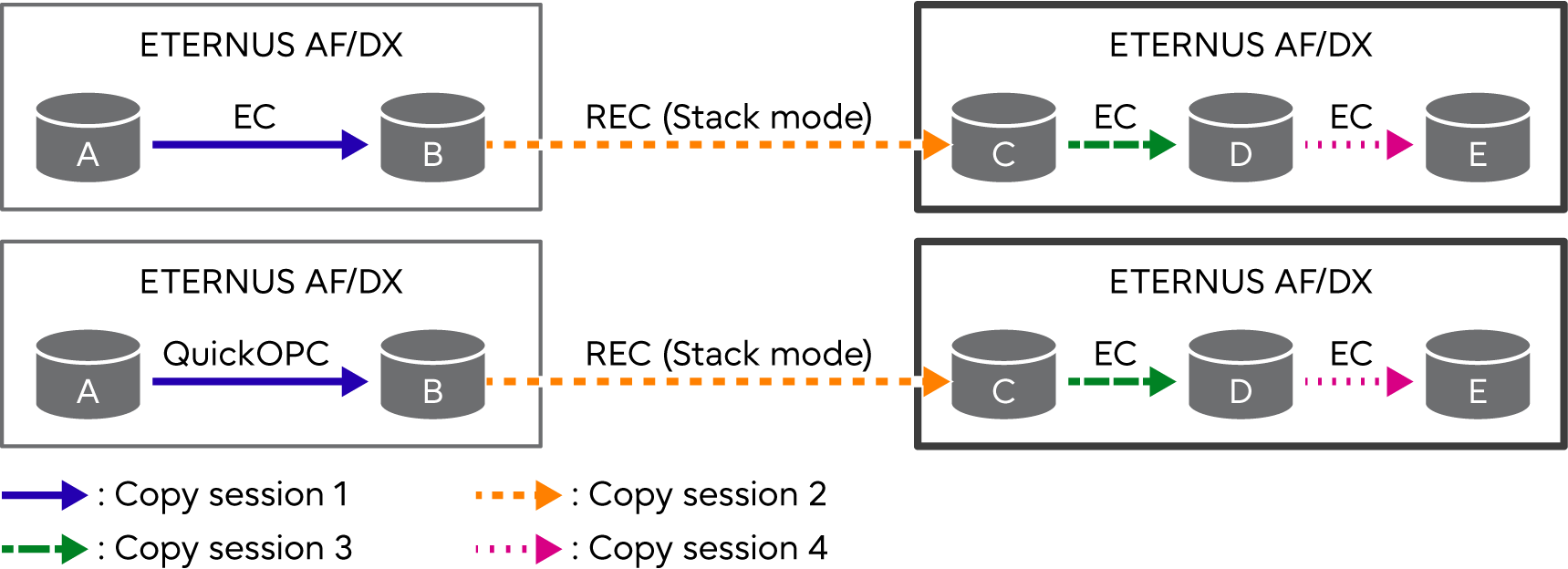
The copy source volume for which a Cascade Copy has already been performed in two copy sessions can be used as the copy destination of a different copy session.
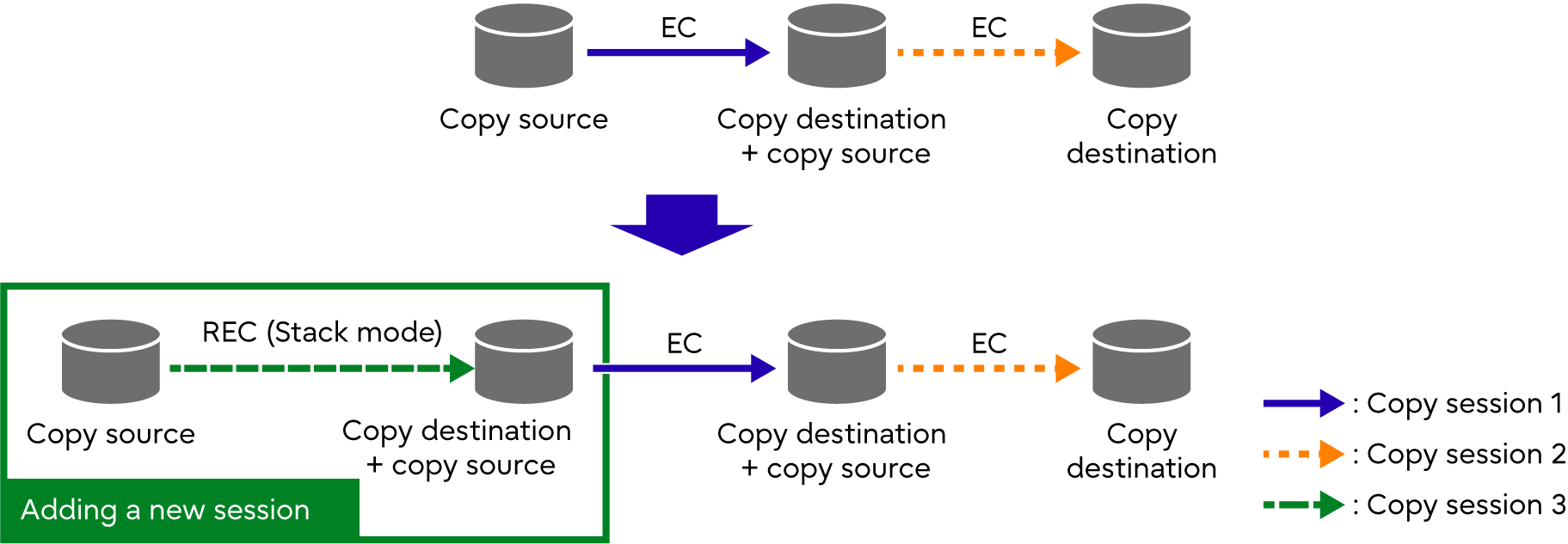
When two sets of copy sessions are already set, the destination volume of the first copy session can be set as the copy source of the second copy session.
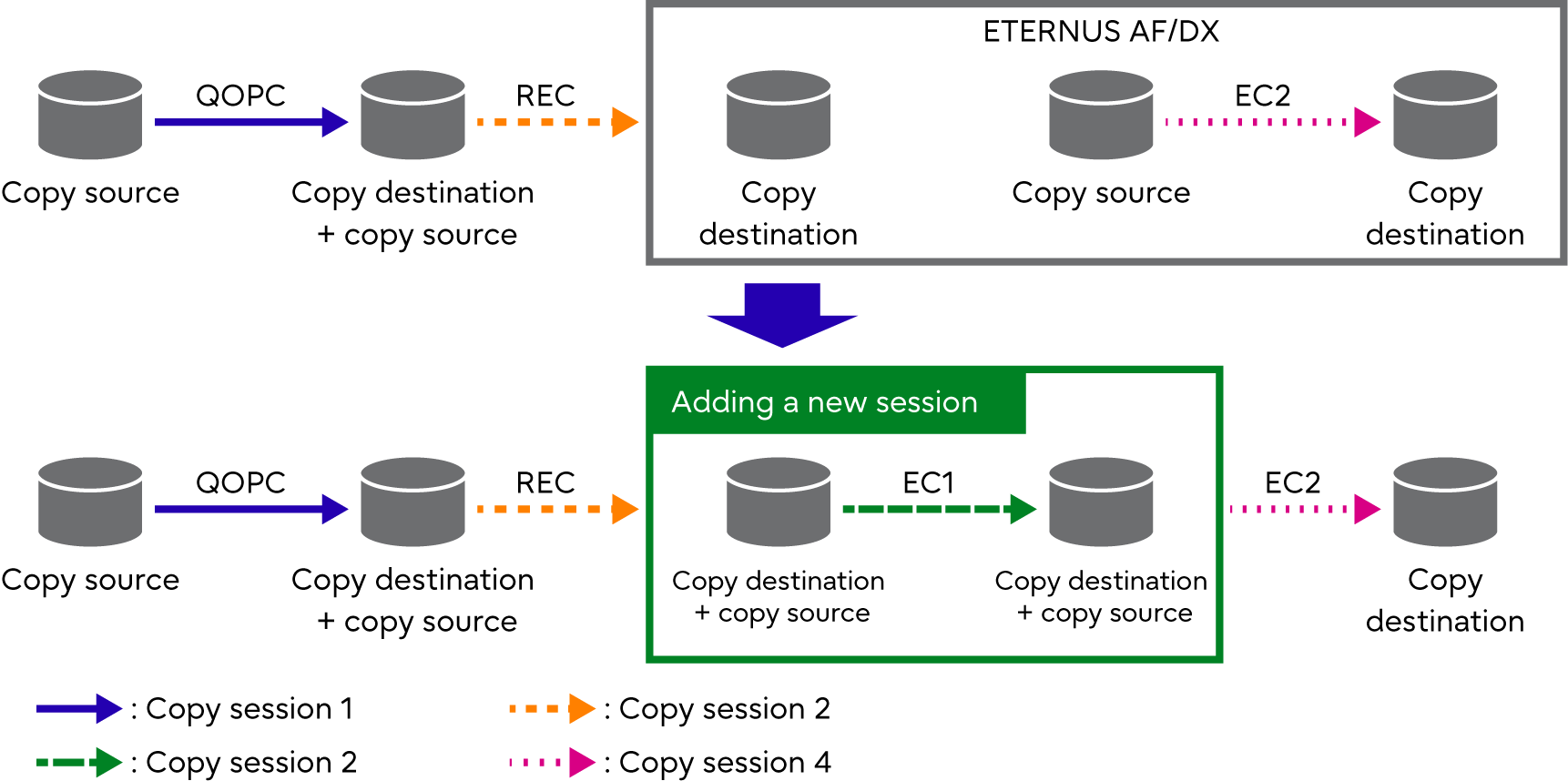
A Cascade Copy that uses the three copy sessions can be performed with the following configuration.
However, three copy sessions cannot be active at the same time. When setting a copy session or resuming a mirroring session, suspend all the other copy sessions in advance.
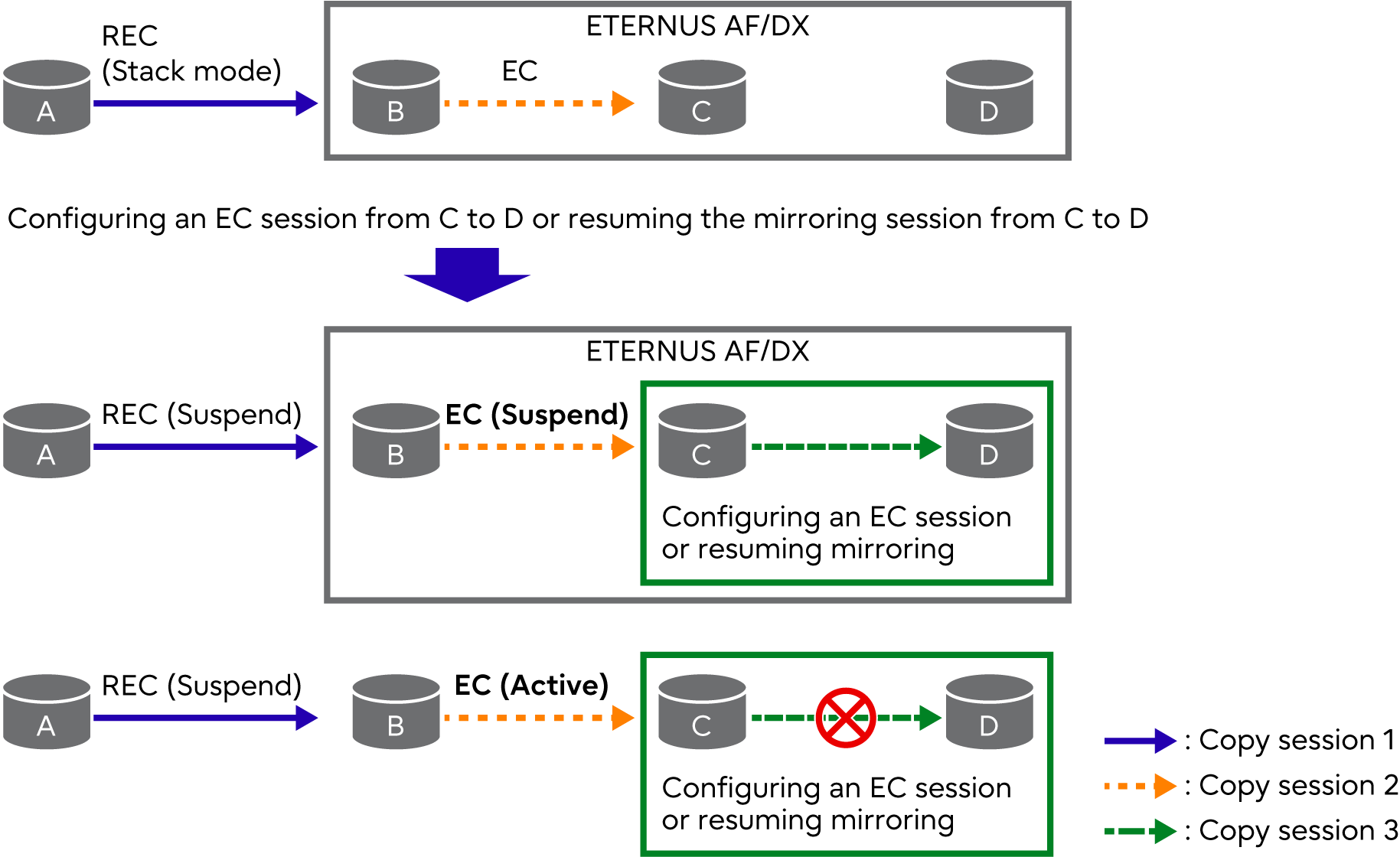
Copy session 1 and copy session 2 must be changed to the Suspend status.
OPC Restoration or EC/REC Reverse from the Cascade Copy State
There are restrictions for the available Cascade Copy combinations when copy session 2 (OPC Restoration or EC/REC Reverse) is restored from the cascade copy state. For details, refer to Table: Restrictions on the Availability of OPC Restoration or EC/REC Reverse during Cascade Copy (1/2) and Table: Restrictions on the Availability of OPC Restoration or EC/REC Reverse during Cascade Copy (2/2).

When OPC Restoration is executed for copy session 1 from the cascade copy state, a cascade copy is performed in three copy sessions. Because of that, there are restrictions on the copy type combinations for copy session 1 and copy session 2. For details, refer to Figure: Cascade Copy (Using Three Copy Sessions) and Figure: Cascade Copy (Cascade Copy with a Session Status Change).
EC/REC Reverse of copy session 2 is allowed after copy session 1 is stopped.
Figure: EC/REC Reverse from the Cascade State (1)
Reverse of copy session 2 is allowed after copy session 1 is reversed.
Figure: EC/REC Reverse from the Cascade State (2)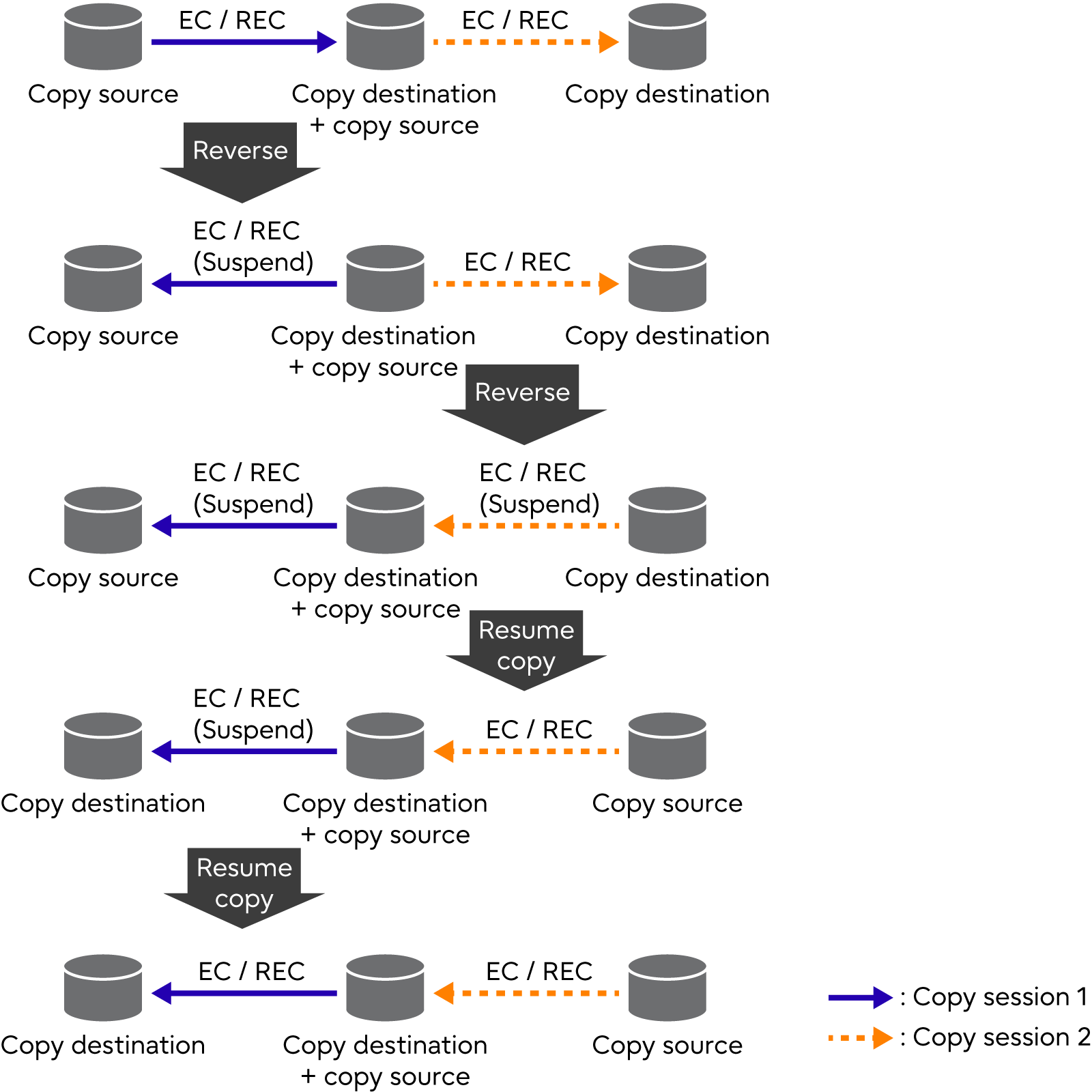
Copy session 1 |
||||
|---|---|---|---|---|
OPC |
QuickOPC |
SnapOPC / SnapOPC+ |
||
Copy session 2 for OPC Restoration |
OPC |
× (*1) |
× (*1) |
— |
QuickOPC |
× (*1) |
× (*1) |
— |
|
SnapOPC |
× (*1) |
× (*1) |
— |
|
SnapOPC+ |
× (*1) |
× (*1) |
— |
|
Copy session 2 for EC/REC Reverse |
EC |
× (*1) |
× (*1) |
— |
REC Synchronous |
× (*1) |
× (*1) |
— |
|
REC Stack |
× (*1) |
× (*1) |
— |
|
REC Consistency |
× (*1) |
× (*1) |
— |
|
Copy session 1 |
|||||
|---|---|---|---|---|---|
EC |
REC Synchronous |
REC Stack |
REC Consistency |
||
Copy session 2 for OPC Restoration |
OPC |
¡ (*2) |
¡ (*2) |
¡ (*2) |
¡ (*2) |
QuickOPC |
¡ (*2) |
¡ (*2) |
¡ (*2) |
¡ (*2) |
|
SnapOPC |
¡ (*2) |
¡ (*2) |
¡ (*2) |
¡ (*2) |
|
SnapOPC+ |
¡ (*2) |
¡ (*2) |
¡ (*2) |
¡ (*2) |
|
Copy session 2 for EC/REC Reverse |
EC |
¡ (*2) |
¡ (*2) |
¡ (*2) |
¡ (*2) |
REC Synchronous |
¡ (*2) |
¡ (*2) |
¡ (*2) |
¡ (*2) |
|
REC Stack |
¡ (*2) |
¡ (*2) |
¡ (*2) |
¡ (*2) |
|
REC Consistency |
¡ (*2) |
¡ (*2) |
¡ (*2) |
¡ (*2) |
|
¡: Limited support ×: Not supported —: Not applicable
| *1 | : | OPC Restoration or EC/REC Reverse of copy session 2 is allowed after copy session 1 is stopped. |
| *2 | : | OPC Restoration or EC/REC reverse of copy session 2 is allowed after copy session 1 is suspended and then EC/REC Reverse of copy session 1 is performed. |
To perform a restore with the following copy session combinations, reverse the order of the copy source and copy destination from the copy session of the cascade source.
REC (Stack mode) g EC g EC
EC g REC (Stack mode) g EC g EC
In addition, transfer data using copy sessions in cascade copy destinations in the order shown below because restoration is performed using backed up data.
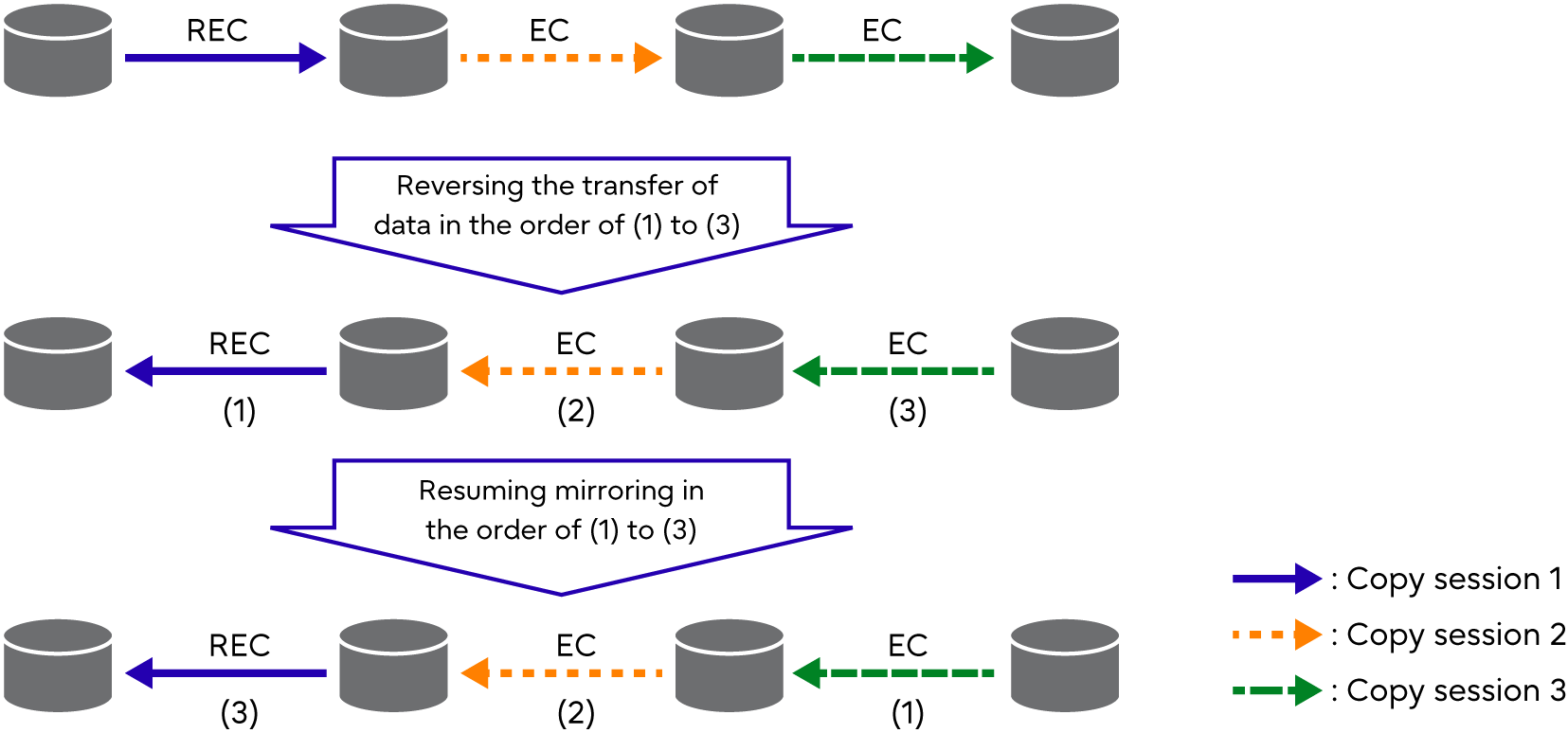
To perform a restore with the following copy session combinations, reverse the order of the copy source and copy destination from the copy session of the cascade source after deleting the copy session of QuickOPC.
QuickOPC g REC (Stack mode) g EC g EC
In addition, transfer data using copy sessions in cascade copy destinations in the order shown below because restoration is performed using backed up data.
For the area between the volumes where QuickOPC was deleted, data is restored after an OPC session is newly set. At this time, unlike EC/REC restoration, note that OPC copies the whole area for which OPC is specified.
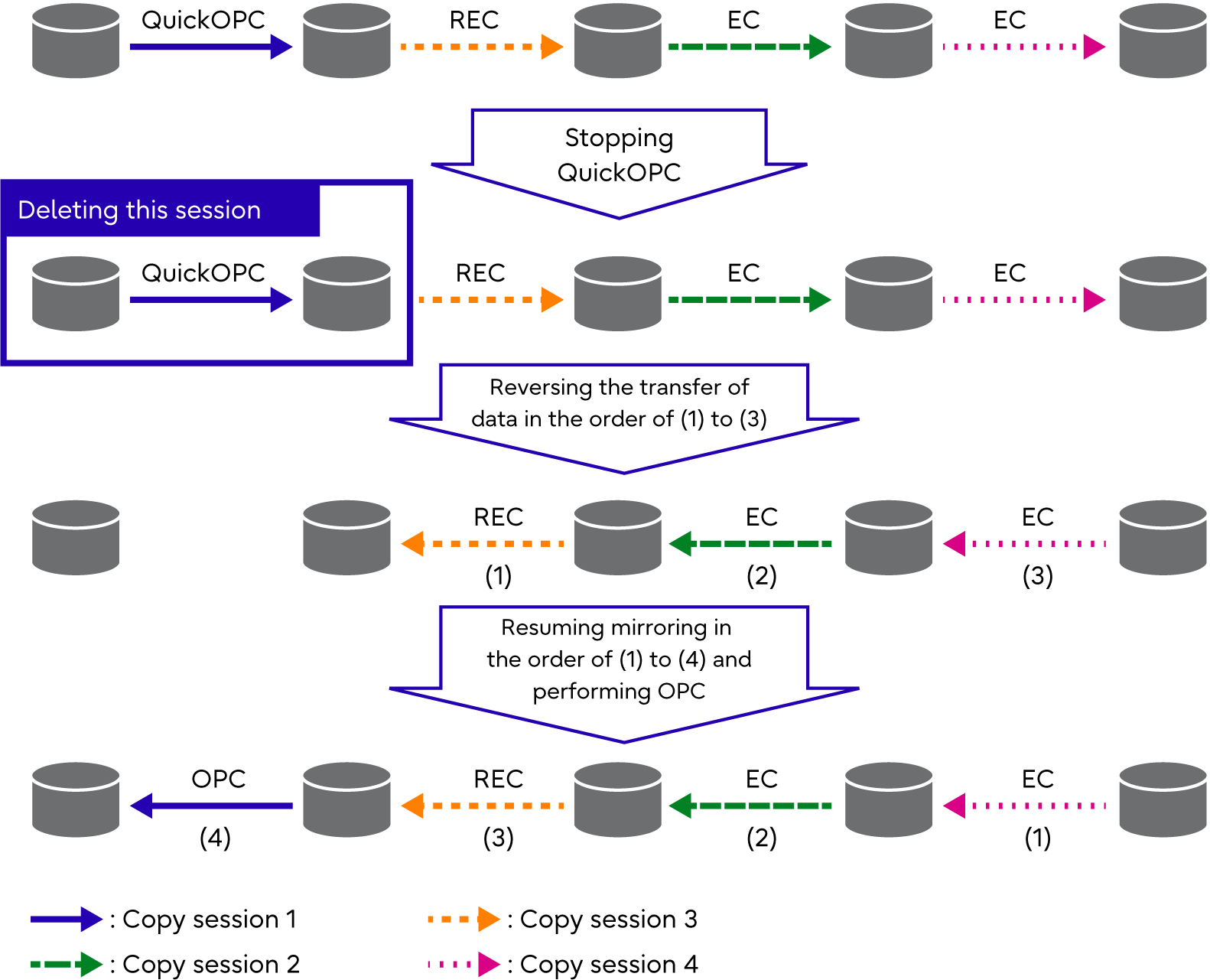
Mixture of Cascade Copy and Multi-Copy
Cascade Copy and multi-copy can be performed at the same time.
In Figure: Mixture of Cascade Copy and Multi-Copy, "Copy session 1" refers to a copy session in which the copy destination area is also used as the copy source area of another copy session. "Copy session 2" refers to a copy session in which the copy source area is also used as the copy destination area of another copy session.
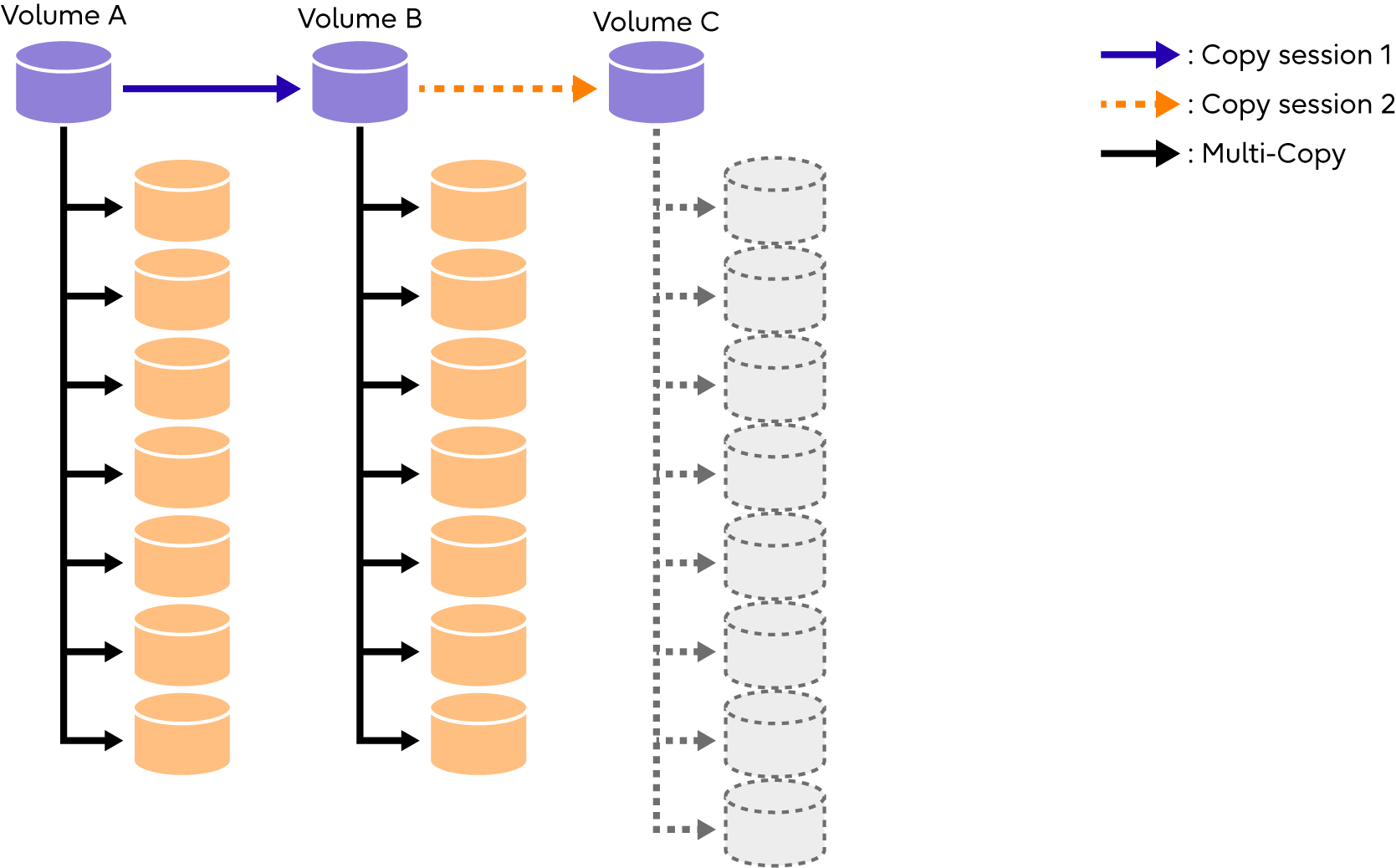
Copy session from copy source volume A
Up to eight copy destinations (including copy session 1) can be used to perform a multi-copy regardless of the copy type.
If the copy type is SnapOPC+, multi-copy can be set up to the maximum generation.
Cascade copy and multi-copy can be mixed even if the range of the copy source for multi-copy does not match perfectly with the range of the copy source for copy session 1. For details, refer to Figure: Targets for the Multi-Copy Function.
Copy session with volume B as the copy source
Up to eight copy destinations (including copy session 2) can be used to perform a multi-copy regardless of the copy type.
If the copy type is SnapOPC+, multi-copy can be set up to the maximum generation.
The range of the copy source for multi-copy must match perfectly with the range of the copy source for copy session 2.
Viewed from copy session 1, eight copy sessions can exist in the cascade destination.
Copy session with volume C as the copy source
Up to eight copy sessions can be used for multi-copy only if copy session 2 is in the REC Stack mode.
If the copy type is SnapOPC+, multi-copy can be set up to the maximum generation.
The range of the copy source for multi-copy must match perfectly with the range of the copy destination for copy session 2.
Viewed from copy session 2, eight copy sessions can exist in the cascade destination.



